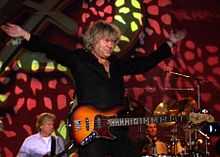John Lodge (musician)
| John Lodge | |
|---|---|
 John Lodge in 2007 | |
| Background information | |
| Birth name | John Charles Lodge |
| Born |
20 July 1945 Erdington, Birmingham England, United Kingdom |
| Genres | Rock, Heavy rock |
| Occupations |
Musician Songwriter Producer |
| Instruments | Bass, Guitar, vocals |
| Years active | 1965–present |
| Labels | Decca, Threshold |
| Associated acts | The Moody Blues, Trapeze |
| Website | John Lodge official website |
| Notable instruments | |
| Fender Jazz Bass | |
John Charles Lodge (born 20 July 1945, Erdington, Birmingham, England) is an English musician, best known as bass guitarist, vocalist, and songwriter of the longstanding rock group, The Moody Blues. He has also worked as a record producer. Lodge has collaborated both with his bandmates in the Moody Blues, and with other musicians outside the band, as well as a successful solo career.
Biography
Early years
Lodge attended school at Birches Green Junior School, Central Grammar School and later went to college at the Birmingham College of Advanced Technology for engineering. His early influences were musicians like Buddy Holly and Jerry Lee Lewis, and by age 15 met up with future bandmate Ray Thomas.[1]
Career with the Moody Blues
Lodge was initially involved in the Birmingham music scene, although he temporarily dropped out to continue his studies. In 1966, however, after the Moody Blues original Bassist Clint Warwick had left the band, Lodge succeeded the temporary deputy Rod Clarke[2] as the permanent bassist and vocalist, rejoining Ray Thomas during the same period as the band recruited guitarist/vocalist Justin Hayward to replace Denny Laine. Lodge's distinctive falsetto ranged from a high harmonious voice and his solid lead vocals were a major asset to the revised Moody Blues from this point on.
Lodge's prolific songwriting for the Moody Blues has created such songs as "Peak Hour", "(Evening) Time to Get Away", "Gimme a Little Something", "Ride My See-Saw", "House of Four Doors", "Eyes of a Child", "Send Me No Wine", "To Share Our Love", "Candle of Life", "Tortoise and the Hare", "Minstrel's Song", "Emily's Song", "Isn't Life Strange" (which earned Lodge an ASCAP songwriting award),[citation needed] "I'm Just a Singer" (which also won him an ASCAP songwriting award),[citation needed] "Steppin' in a Slide Zone","Survival", "Talking Out of Turn", "Nervous", "Sitting at the Wheel","Hole in the World", "Under My Feet", "It May Be a Fire", "Rock 'n' Roll Over You", "Love Is on the Run", "Here Comes the Weekend", "Lean on Me (Tonight)", "Shadows on the Wall", "Magic","Wherever You Are", "Love Don't Come Easy", "Words You Say", "Forever Now", "On This Christmas Day","The Spirit of Christmas", and "Gemini Dream" — the latter being a co-composition with Justin Hayward that won them jointly an ASCAP songwriting award. Bass Player magazine voted him amongst the most influential bass players.[citation needed]
Lodge co-wrote "Out and In" with Mike Pinder, recorded on To Our Children's Children's Children in 1969. He also collaborated with fellow Moody Blues member Justin Hayward on the 1975 album Blue Jays released on Threshold Records, which in addition to Hayward's compositions included three songs written by Lodge; "Maybe", "Saved by The Music" and "You", together with two tracks co-written by Lodge & Hayward; "Remember Me (My Friend)" and "When You Wake Up", and later, Lodge released a solo album, Natural Avenue, on Decca in 1977, from which the single, "Say You Love Me" was issued. During the 1970s, he produced music for the band Trapeze.
In 1980, Lodge released a non-album solo single "Street Cafe" b/w "Threw It All Away" on Decca this single featured future Moody Blues keyboardist Patrick Moraz. Since 1981, Lodge has co-written songs for the band with Justin Hayward, such as: "Meet Me Halfway", "Talkin' Talkin'", "Slings And Arrows", "Running out of Love", "Miracle", "Breaking Point", "Want to Be With You", "Once Is Enough", "Highway", "Is This Heaven?", "Sooner or Later (Walking on Air)", "Strange Times", and "The One", amongst others.
Through most of his career he played a Fender Precision Bass. For the last several years he has been playing a Fender Jazz Bass. Other instruments include a custom-made Fender double-neck bass and guitar which replaced a similar model by Rickenbacker, acoustic bass and acoustic 12-string by Guild.
In 1985, the Moody Blues picked up the Ivor Novello Award for Outstanding Contribution to Music.[citation needed]
Personal life
Lodge has been married to his wife, Kirsten, since 1968, and they are the parents of two grown children. Their first child, a daughter named Emily, was born in 1970 for whom Lodge wrote "Emily's Song" included on the 1971 Moody Blues album, Every Good Boy Deserves Favour. His son Kristian was born two years later. Lodge has spoken on several occasions about his belief as an evangelical Christian, and credits his faith with preventing him from sinking into the dangerous elements of the rock music business.[3] John is a supporter of his local football team, Birmingham City F.C.
References
- ↑ "John Lodge.com". John Lodge.com. Retrieved 27 June 2013.
- ↑ Tony Brown (23 November 1942). "Rod Clark page 1". Themoodyblues.co.uk. Retrieved 27 June 2013.
- ↑ Bruce, Billy (31 August 2000). "Born-Again Rock Stars". Christian rock stars. Charisma magazine. Retrieved 16 February 2012.
External links
|